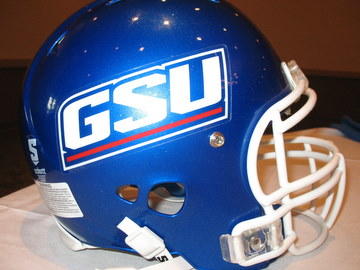
Section Branding
Header Content
Georgia State Kicks-Off Its Football Program
Primary Content

The Georgia State Panthers took the field for their first-ever football game on Thursday, September 2nd. And it scored the 41-7 victory over Shorter University in front of more than 30,000 fans inside the Georgia Dome.
The downtown Atlanta university hopes having football will boost its image. Edgar Treiguts reports it’s an expensive proposition, which the school hopes will pay off.
On a hot and humid afternoon in early August, 90 Georgia State football players are on a downtown Atlanta field stretching for practice. Amid the coaches’ whistles and instructions comes a regular reminder of this team’s inner city existence—the rumble of the MARTA mass transit train, running high alongside the field.
The school’s practice area is shoehorned in between that MARTA line and the noisy downtown interstate.
But it’s a field of dreams in the eyes of Georgia State University president Mark Becker. He says the new football program will put his school on the map
"There will be more more TV coverage, there’s more newspaper coverage. If that puts Ga State higher in people’s mind’s, that raises the value of everybody’s Ga St degree.”
And Becker says that degree is already more popular. Enrollment has gone up by 6,000 students since announcing the football program two years ago. All 31,000 students will now get what he calls the “full traditional college experience”. And Ga. State hopes to finally shed its “commuter school” label.
But it comes at a cost. Students fees were hiked by $85 to help pay for football. Much to the dislike of GSU senior Will Lavin.
"I don’t know anybody that was happy about that . It seems like it’s going up more and more each year."
The football program eats-up a quarter of the athletic department’s budget. But more money is needed, to pay for things like new practice facilities, stadium expenses and more.
Old Dominion University in Norfolk,Virginia will be one of Ga. State’s rivals. That program started only last year, and found immediate success. It turned a profit (about a million dollars), and all games were sold out. But ODU athletic director Camden Wood Selig says that’s not the norm:
“I think most programs at the 1-2A level would be very happy just to break even. Many of them are losing millions...a couple million dollars a year fielding a football program.”
Georgia State thinks it can make it work. It’s best salesman is head coach Bill Curry, a veteran who’s coached at Georgia Tech, Alabama, and Kentucky.
Curry was prepared for most of the challenges of building a program, except for one thing:
“Huge surprise and that’s the economy. That has made the job infinitely more difficult...and yet it’s a lot like football. It’s not going to be easy, you get knocked down. So we just got up off the ground and went back...and we got some wonderful people who have decided to pitch in financially. And they’ve really saved the day to tell you the truth.”
Curry alludes to the largest gift ever made to Ga. State’s athletic program -- $1.5 million from alumnus and local Atlanta businessman Pete Petit. That money is helping to build the team’s practice complex.
But checks like that are rare. The real work is trying to get the $200, $100, even 50-dollar amounts from the rank-and-file alumni, like Ginger Garner, a 2000 graduate.
“There is a culture that we haven’t taken apart of in the past. But its nice to be able to promote my team, and hear people talk about the Jackets and the Dogs, and I can say no-no...the Panthers.”
Of course, the Panthers are toddlers compared to established programs like the Bulldogs or Yellow Jackets. But Ga. State play-by-play announcer Dave Cohen says the school doesn’t need to worry about that:
“I never look at it as competing with Ga.Tech or Georgia. Let’s just go ahead and be the best Georgia State that we can be...the best product and athletes on the field. Continue to move in the direction that we’re moving."
Georgia State plays its first-ever football game Thursday (Sep 2) inside the Ga Dome against Shorter University.
Tags: Atlanta, Mark Becker, Georgia State University, college football, Edgar Treiguts, Dave Cohen
